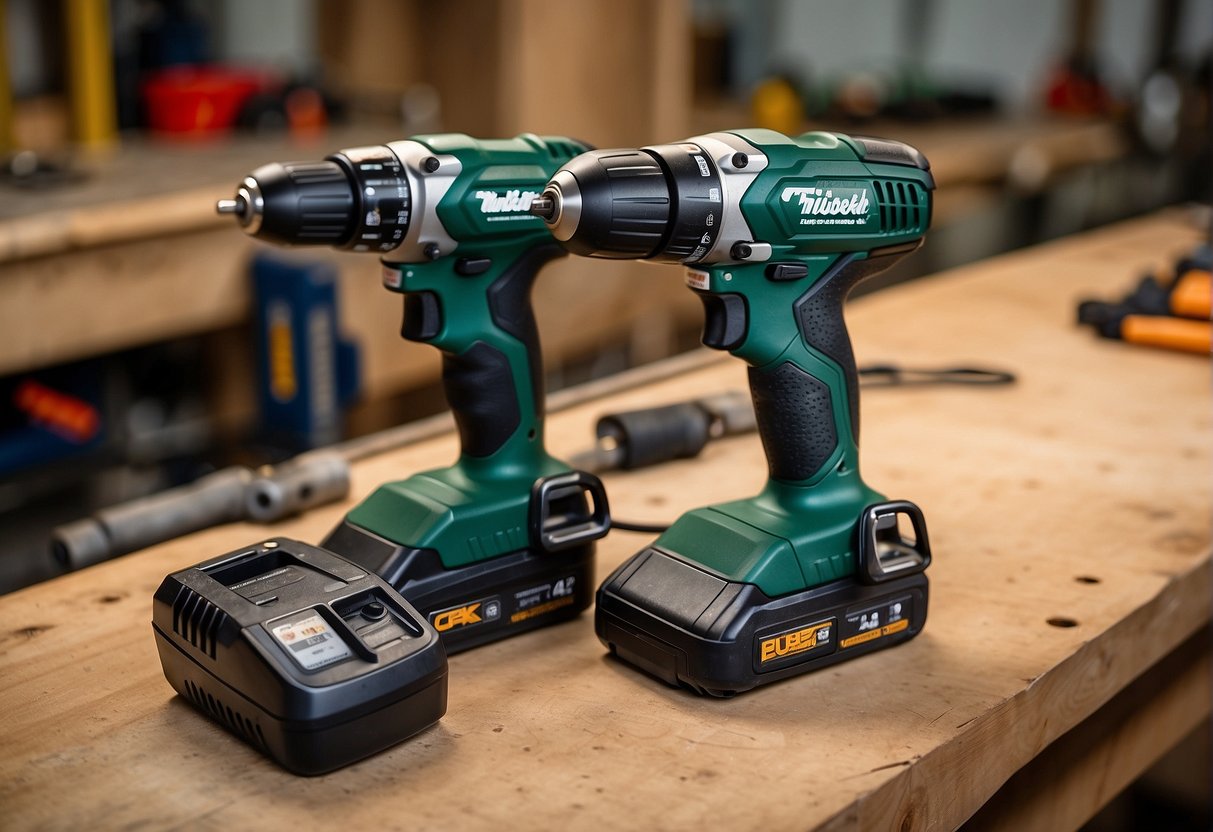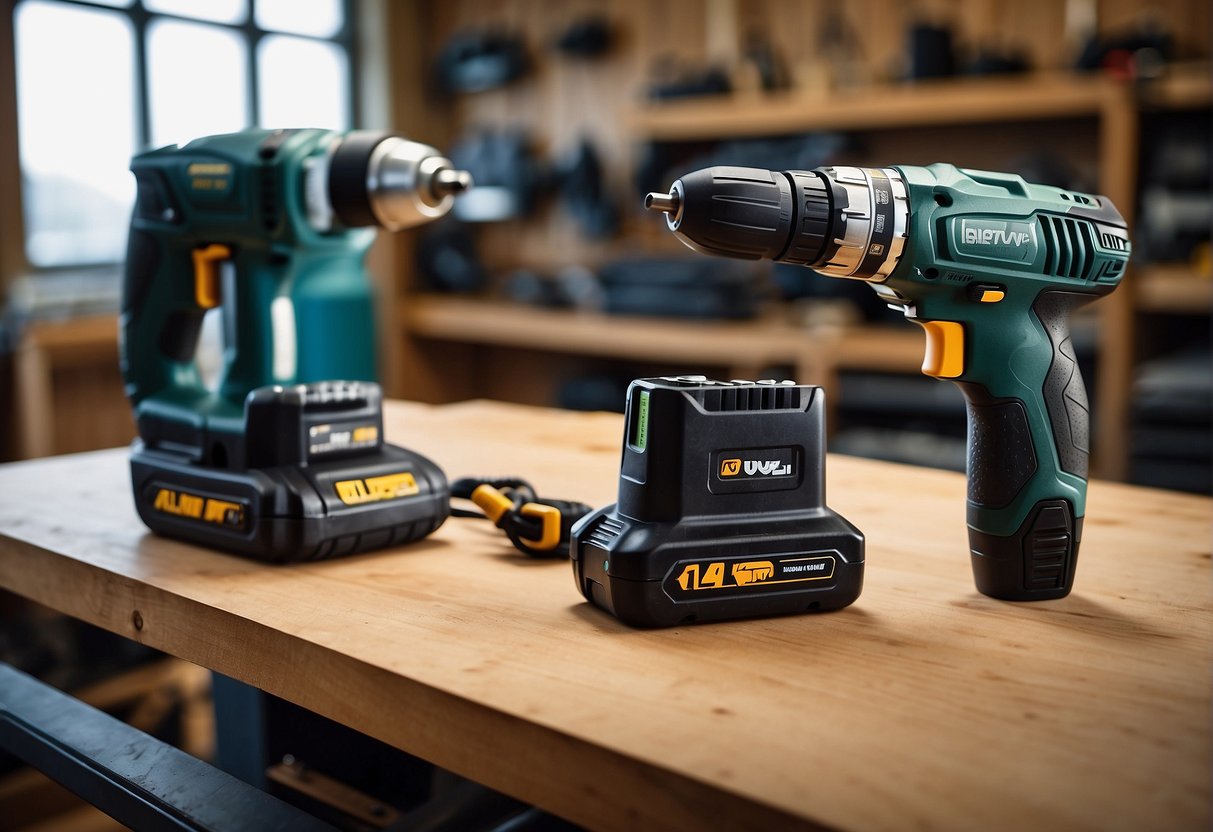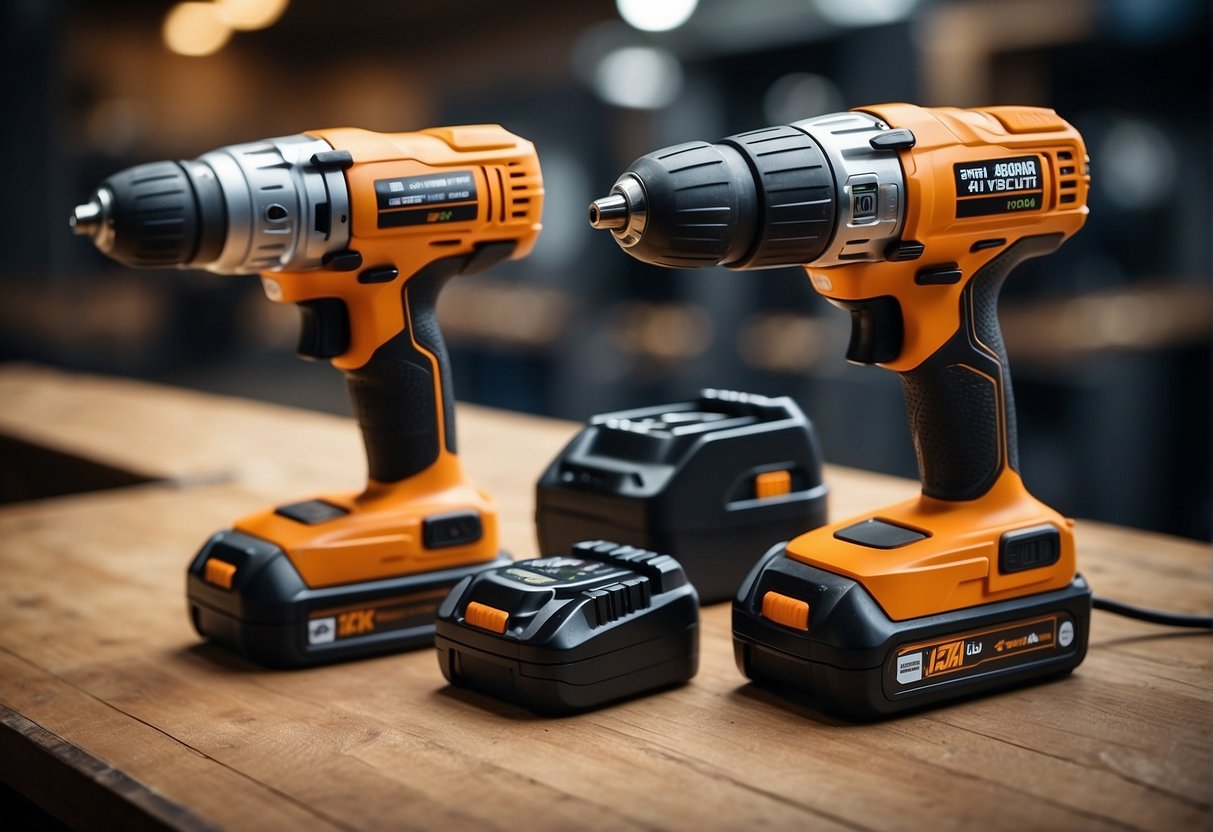When it comes to power tools, drills are among the most commonly used. Cordless drills have become increasingly popular in recent years due to their convenience and portability. However, with so many options available, it can be difficult to determine which drill is right for your needs. One of the most significant factors to consider is voltage, with the two most common options being 12V and 18V drills.
Understanding drill voltage is essential when choosing the right tool for the job. Voltage refers to the amount of power the drill can produce, with higher voltage drills generally being more powerful. However, more power doesn’t always equate to better performance, as it can also result in a heavier and bulkier tool that may not be suitable for certain applications. It’s important to consider the type of work you’ll be doing to determine the appropriate voltage for your needs.
Comparing 12V and 18V drill applications is an essential step in determining which tool is right for you. 12V drills are generally more compact, lightweight, and easier to maneuver, making them ideal for tasks that require precision and control. On the other hand, 18V drills are typically larger and more powerful, making them better suited for heavy-duty applications. While 18V drills may be more versatile, they can also be more cumbersome and challenging to handle, which may not be suitable for some users.
Understanding Drill Voltage
As a DIY enthusiast or a professional contractor, you might be wondering which drill voltage is the best for your needs. In this section, I will explain the difference between 12V and 18V drills, their advantages, and which one is suitable for specific applications.
Voltage and Power Output
The voltage of a drill determines its power output. A drill with a higher voltage has more power and can handle more demanding tasks. The power output of a drill is measured in watt-hours (Wh), which is the product of voltage and ampere-hours (Ah) of the battery. Therefore, a drill with an 18V battery has more power than a 12V battery.
12V Drills: Compact and Lightweight
12V drills are compact, lightweight, and easy to handle. They are perfect for light-duty tasks such as drilling small holes, driving screws, and assembling furniture. They are also ideal for working in tight spaces where a larger drill cannot fit. 12V drills are less powerful than 18V drills, but they are more affordable and have longer battery life.
18V Drills: High Performance and Torque
18V drills are high performance and have more torque than 12V drills. They are suitable for heavy-duty tasks such as drilling large holes, driving long screws, and mixing mortar. They are also ideal for professionals who need a drill that can handle demanding applications. 18V drills are more expensive than 12V drills, but they are worth the investment if you need a powerful and reliable tool.
In conclusion, the choice between a 12V and 18V drill depends on the type of work you will be doing. If you need a drill for light-duty tasks, a 12V drill is a good choice. If you need a drill for heavy-duty tasks or professional use, an 18V drill is the better option.
Comparing 12V and 18V Drill Applications
When it comes to choosing between 12V and 18V drills, it is important to consider the specific applications for which you will be using the tool. While both types of drills have their advantages and disadvantages, understanding the typical uses for each can help you make an informed decision.
Typical Uses for 12V Drills
12V drills are generally smaller and lighter than their 18V counterparts, making them ideal for DIY projects and lighter-duty tasks. They are also easier to maneuver in tight spaces, making them a good choice for tasks that require a more delicate touch.
Some typical uses for 12V drills include:
- Drilling small holes in wood, plastic, and drywall
- Driving screws and other small fasteners
- Assembling furniture and other household items
- Installing hardware such as cabinet knobs and drawer pulls
While 12V drills can handle some heavier-duty tasks, they may struggle with tougher materials such as concrete, metal, masonry, and bricks. If you plan on working with these materials frequently, an 18V drill may be a better choice.
When to Choose an 18V Drill
If you frequently tackle heavy-duty tasks or work with tougher materials, an 18V drill may be a better choice. These drills are generally more powerful and can handle more demanding jobs with ease.
Some typical uses for 18V drills include:
- Drilling larger holes in wood, metal, and masonry
- Driving larger screws and fasteners
- Mixing paint and other materials
- Demolition work such as breaking up concrete or removing tile
While 18V drills are more powerful than 12V drills, they are also heavier and bulkier. This can make them more difficult to maneuver in tight spaces, so it is important to consider the specific needs of your project before making a decision.
In summary, when choosing between a 12V and 18V drill, it is important to consider the specific applications for which you will be using the tool. While 12V drills are ideal for DIY projects and lighter-duty tasks, 18V drills are better suited for heavy-duty tasks and tougher materials.
Battery Technology and Efficiency
As battery technology continues to advance, the debate over 12V vs 18V drills has become more nuanced. In this section, I will discuss the differences in battery technology and efficiency between the two types of drills.
Charge Time and Battery Life
One of the primary differences between 12V and 18V drills is the battery life and charge time. 18V drills generally have larger battery capacity, which means they can run for longer periods of time before needing to be recharged. This is especially true when it comes to heavy-duty tasks that require more power. However, this also means that 18V batteries take longer to charge than 12V batteries.
On the other hand, 12V drills have smaller batteries, which means they have shorter run times but faster charge times. This can be advantageous for those who need to use their drills frequently but don’t want to wait for the battery to charge.
Advancements in Battery Technology
Lithium-ion technology has revolutionized battery technology for power tools, including drills. Lithium-ion batteries are more efficient than their NiCad counterparts, which means they are lighter, charge faster, and have longer run times. They also have a longer lifespan, which means they can be charged and discharged more times before losing their capacity.
In addition to lithium-ion technology, there have been other advancements in battery technology that have improved the efficiency of both 12V and 18V drills. For example, some manufacturers have developed smart chargers that can communicate with the battery and optimize the charging process. This can help extend the life of the battery and improve its performance.
Overall, the choice between a 12V and 18V drill will depend on your specific needs and preferences. If you need a drill that can handle heavy-duty tasks and don’t mind waiting for the battery to charge, an 18V drill may be the right choice for you. However, if you need a drill that is lightweight and has faster charge times, a 12V drill may be a better option.
Design and Ergonomics
When it comes to design and ergonomics, there are some significant differences between 12-volt and 18-volt drills. In this section, I will discuss the size, weight, handling, and comfort of each type of drill.
Size and Weight Considerations
One of the most significant differences between the two types of drills is their size and weight. Generally, 12-volt drills are smaller and lighter than 18-volt drills. This makes them a great choice for those who need a drill for light-duty work or for working in tight spaces. On the other hand, 18-volt drills are larger and heavier, which makes them better suited for heavy-duty work.
Handling and Comfort
Another important factor to consider when choosing between a 12-volt and 18-volt drill is handling and comfort. Both types of drills come with different handles and grips, which can affect how comfortable they are to use. Some 12-volt drills come with pistol grips, which can be more comfortable for some users. Meanwhile, some 18-volt drills come with T-handles, which can provide better balance and control.
When it comes to comfort, it’s also important to consider the weight of the drill. A heavier drill can cause fatigue and strain on your hands and arms, especially if you’re using it for an extended period. Therefore, it’s essential to choose a drill that is comfortable to use and won’t cause any discomfort or pain.
In terms of PPE, it is always recommended to wear gloves when using a drill to protect your hands from debris and sharp edges. It is also important to wear safety glasses to protect your eyes from flying debris.
Overall, the size, weight, handling, and comfort of a drill are essential factors to consider when choosing between a 12-volt and 18-volt drill. Depending on your needs and preferences, one type of drill may be more suitable for you than the other.
Cost and Value Analysis
Initial Investment vs. Longevity
When it comes to choosing between a 12V and an 18V drill, cost is a major factor to consider. In general, 18V drills are more expensive than 12V drills. However, it’s important to consider the longevity of the drill when making a purchase. While 12V drills may be cheaper upfront, they may not last as long as their 18V counterparts. This means that you may end up having to replace your 12V drill sooner than you would an 18V drill, ultimately costing you more in the long run.
It’s worth noting that the cost of batteries can also impact the overall cost of the drill. 18V drills typically require larger, more expensive batteries than 12V drills. However, these batteries often last longer and provide more power, making them a better value in the long run.
Brand and Quality Impact on Price
Another factor to consider when it comes to the cost of 12V vs 18V drills is the brand and quality of the drill. Power tool brands that are known for their high-quality products may charge more for their 18V drills than other brands charge for their 12V drills. However, it’s important to keep in mind that the higher cost may be worth it in terms of the longevity and performance of the drill.
When it comes to choosing between a 12V and an 18V drill, it’s important to consider both the upfront cost and the long-term value of the drill. While 12V drills may be a more affordable option initially, they may not last as long as 18V drills and may end up costing you more in the long run. Additionally, the brand and quality of the drill can impact the overall cost, so it’s important to do your research and choose a drill that provides the best value for your needs and budget.
Frequently Asked Questions
What are the performance differences between 12V and 18V drills?
The primary difference between 12V and 18V drills is power. 18V drills have more power than 12V drills, which means they can handle tougher tasks and provide more torque and speed. However, 12V drills are lighter and more compact, making them ideal for lighter tasks and hard-to-reach areas.
Can a 12V drill handle heavy-duty tasks as effectively as an 18V drill?
No, a 12V drill is not as powerful as an 18V drill, so it may not be able to handle heavy-duty tasks as effectively. However, a 12V drill can still be useful for light DIY tasks and general use around the home.
What are the advantages of using an 18V drill over a 12V drill?
The primary advantage of using an 18V drill is its power. 18V drills are more powerful than 12V drills, which means they can handle tougher tasks and provide more torque and speed. Additionally, 18V drills typically have larger batteries, which means they can run for longer periods of time.
Are there any compatibility issues when using an 18V battery with a 12V drill?
Yes, there can be compatibility issues when using an 18V battery with a 12V drill. 18V batteries are typically larger and heavier than 12V batteries, which means they may not fit in a 12V drill. Additionally, an 18V battery may provide too much power for a 12V drill, which can cause damage to the drill or the battery.
How does battery voltage affect the torque and speed of a cordless drill?
Battery voltage affects the torque and speed of a cordless drill by providing more power to the motor. The higher the voltage, the more power the motor has, which means the drill can provide more torque and speed. However, higher voltage batteries are typically larger and heavier, which can make the drill less portable and more difficult to use in tight spaces.
Is a 12V drill sufficient for professional or only for light DIY work?
A 12V drill is typically not sufficient for professional work, as it may not have enough power to handle heavy-duty tasks. However, a 12V drill can be useful for light DIY tasks and general use around the home. Professionals may want to consider using an 18V drill or higher for heavy-duty tasks.

Hi, I’m Sal Muller of Tooltrip.com. My DIY experience led me to understand essential power tools for home projects. Tooltrip.com guides enthusiasts and professionals in choosing right tools for any job. I provide concise top tool reviews for easier, efficient DIY.




